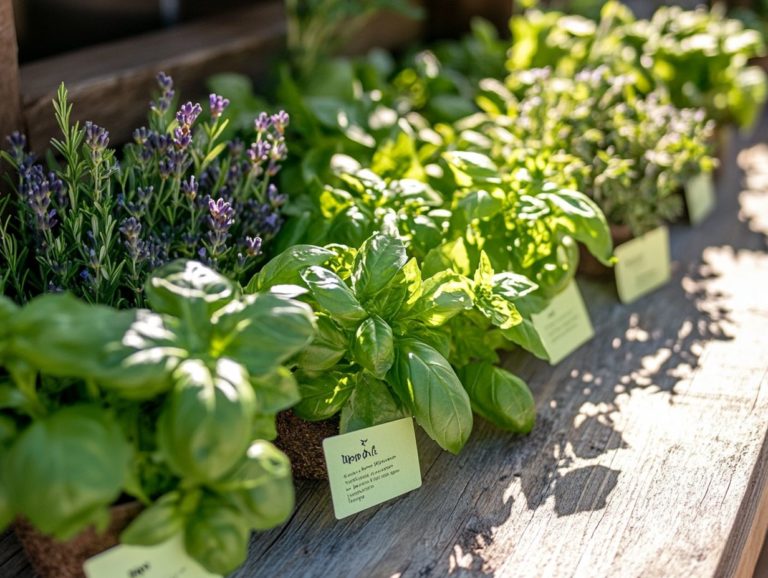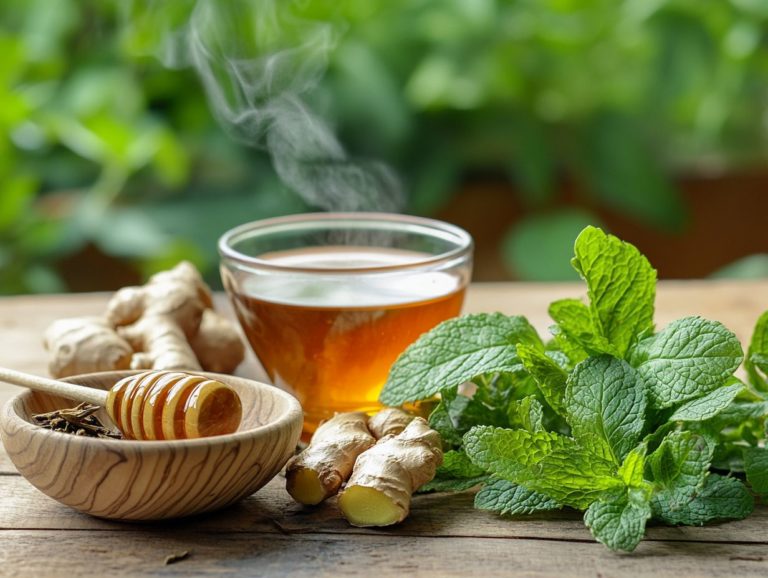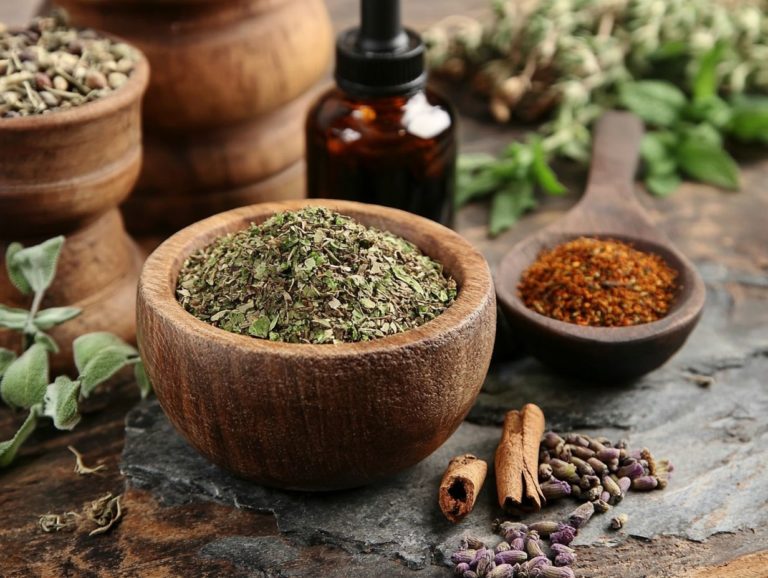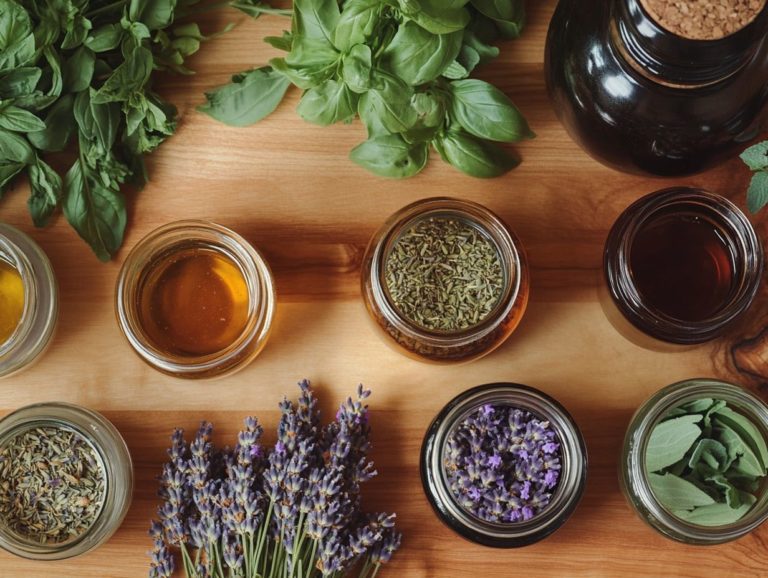Using Herbs to Manage Diabetes Symptoms
Diabetes is a complex condition that affects millions around the globe, presenting a range of symptoms that can profoundly impact daily life. Understanding the intricacies of diabetes and its common effects is essential for effective management, particularly in the context of type 2 diabetes.
Join us as we explore both traditional and natural methods for managing diabetes symptoms, spotlighting the top herbs that can aid in blood sugar control, support nerve health, and promote heart health. You ll also find practical advice on seamlessly incorporating these remedies into your daily routine.
Discover with us the valuable role that herbs can play in your diabetes management journey, including insights from the American Diabetes Association.
Contents
- Key Takeaways:
- Understanding Diabetes and its Symptoms
- Traditional and Alternative Approaches to Managing Diabetes
- Top Herbs for Managing Diabetes Symptoms
- Incorporating Herbs into Your Diabetes Management Plan
- Frequently Asked Questions
- How can using herbs help manage diabetes symptoms?
- What are some commonly used herbs for managing diabetes symptoms?
- Is it safe to use herbs to manage diabetes symptoms?
- How should herbs be used to manage diabetes symptoms?
- Can herbs be used as a replacement for medication for managing diabetes symptoms?
- Are there any risks associated with using herbs to manage diabetes symptoms?
Key Takeaways:
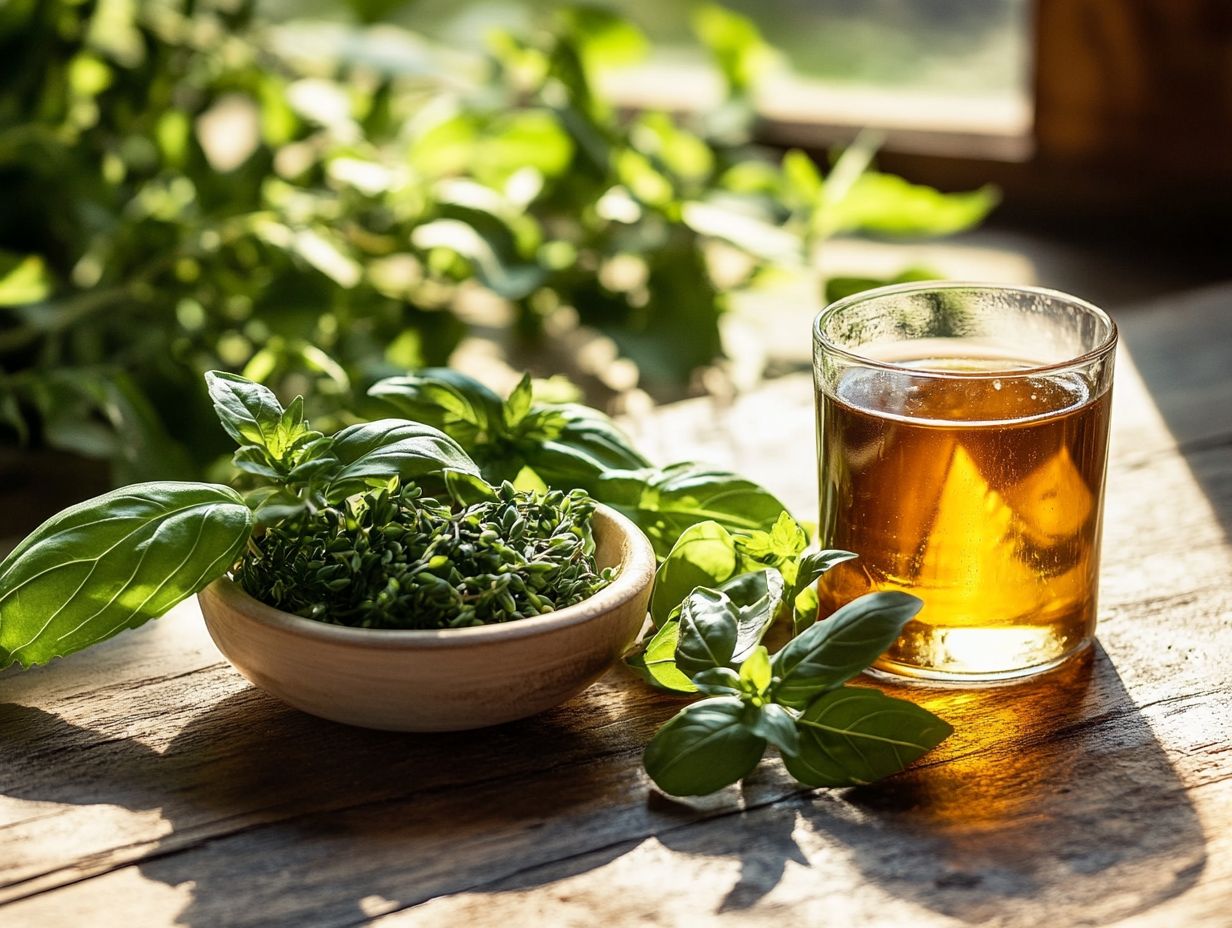
- Adding certain herbs to your diabetes management can boost blood sugar control and support nerve and heart health.
- Cinnamon and bitter melon are two herbs that may help manage diabetes symptoms. Always check with a healthcare professional before adding new herbs.
- Use herbs as a complement, not a replacement, for traditional treatments. Monitor your blood sugar levels and consult a healthcare professional for advice.
Understanding Diabetes and its Symptoms
To manage diabetes, especially type 2 diabetes, you need to know the symptoms, management strategies, and potential complications that could significantly impact your overall health. This chronic condition disrupts your body’s ability to maintain balanced blood sugar levels, leading to various health concerns if not managed properly.
Healthcare professionals consistently highlight the critical nature of early detection and intervention to prevent the progression of diabetes complications. Familiarizing yourself with symptoms like increased thirst, frequent urination, and fatigue enables you to seek timely assistance, thereby reducing the risks associated with this disease.
What is Diabetes?
Diabetes mellitus, especially type 2 diabetes, is a chronic metabolic condition characterized by insulin resistance when your body doesn t use insulin properly and elevated blood glucose levels.
This condition develops when your body becomes less responsive to insulin, the hormone crucial for facilitating glucose uptake by cells for energy. Over time, as your body requires more insulin to manage blood sugar levels, the pancreas may struggle to meet this increasing demand, resulting in persistently high blood sugar levels.
In contrast to type 1 diabetes, an autoimmune disorder leading to the destruction of insulin-producing cells, type 2 is often linked to lifestyle choices and genetic factors. Current statistics reveal that nearly 34 million Americans are living with diabetes, with type 2 constituting about 90-95% of these cases, contributing to the rise of metabolic diseases.
Key risk factors include obesity, sedentary lifestyles, and advancing age. It s essential for you to understand your health status to take proactive steps in mitigating potential complications.
Common Symptoms and Effects
Common symptoms of diabetes include increased thirst, frequent urination, and fatigue, often resulting from elevated blood sugar levels and dysregulation of fasting blood glucose. These indicators highlight significant challenges in managing the condition, emphasizing the importance of proactive health measures, including the adoption of a diabetes diet.
Regularly monitoring fasting blood glucose and hemoglobin A1C levels is essential for you. This practice helps gauge both your immediate and long-term blood sugar control. If left unchecked, uncontrolled diabetes can lead to serious complications such as cardiovascular diseases, nerve damage, and kidney dysfunction.
Acting quickly on these symptoms is crucial, as high blood sugar can seriously impact your well-being.
Traditional and Alternative Approaches to Managing Diabetes
Effectively managing diabetes demands a holistic approach that seamlessly integrates both traditional and alternative methods, focusing on diabetes prevention and enhancing your overall health outcomes.
Overview of Traditional Treatments

Traditional treatments for diabetes primarily hinge on pharmaceutical drugs that support insulin production and assist in glucose management.
In addition to these medications, various oral agents are available, such as metformin, sulfonylureas, and DPP-4 inhibitors. These agents are designed to enhance your body s responsiveness to insulin or reduce glucose production.
For those with more advanced conditions, insulin therapy can be critical. Insulin is a hormone that helps regulate blood sugar levels. This therapy is available in various forms, including rapid-acting, long-acting, and combination therapies, tailored specifically to your individual needs.
These medical interventions yield the best results when combined with lifestyle strategies. Embracing a balanced diet, engaging in regular physical activity, and focusing on weight management can create a holistic approach that enables you to effectively regulate your blood sugar levels and improve insulin sensitivity.
Benefits of Using Herbs for Diabetes Management
Herbal medicine presents a wealth of benefits for managing diabetes, especially through the use of plant remedies that can boost insulin sensitivity and support your overall health.
By incorporating particular herbs like cinnamon and bitter melon into your daily routine, you can significantly aid your efforts to regulate blood sugar levels. For example, cinnamon has been shown to mimic insulin, making it a valuable addition to your meals. Whether sprinkled on oatmeal or blended into a refreshing smoothie, its cinnamon benefits are noteworthy! Additionally, exploring herbs for managing chronic pain can further support your health.
On the other hand, bitter melon has a rich history in traditional medicine and is often consumed as juice or in supplement form. It is recognized for its ability to lower blood glucose levels.
These herbs not only help you maintain blood sugar control but also combat oxidative stress. They provide a powerful way to manage diabetes effectively while enhancing your overall well-being through the use of herbal medicine.
Top Herbs for Managing Diabetes Symptoms
A range of herbs has demonstrated effectiveness in managing diabetes symptoms and regulating blood sugar levels, positioning them as essential elements in a comprehensive approach to diabetes management.
By incorporating these natural remedies into your routine, you can enhance your overall strategy and take charge of your health more effectively.
Herbs for Blood Sugar Control
Several herbs, such as aloe vera, fenugreek, and bitter melon, have shown great promise in helping you manage blood sugar levels. They are noteworthy allies for anyone navigating the challenges of diabetes treatment.
These natural remedies come with unique properties that not only assist in regulating blood sugar but also enhance your overall health. For instance, aloe vera is celebrated for its capacity to improve insulin sensitivity and reduce inflammation. Additionally, fenugreek seeds can help slow down carbohydrate absorption, effectively minimizing those post-meal glucose spikes you want to avoid, further supporting your diabetes diet. Exploring herbs that support healthy blood sugar can also be beneficial.
Bitter melon contains compounds that act like insulin, significantly boosting your glucose metabolism. Research, including randomized controlled trials, backs the use of these herbs, proving their effectiveness and safety in improving diabetes management.
By incorporating these herbs into a well-rounded diet, you may find yourself better equipped on your journey toward optimal blood sugar control and managing diabetes-related conditions.
Take charge of your health today! Discover the powerful benefits of integrating traditional and herbal remedies into your diabetes management plan!
Herbs for Nerve Health
Maintaining nerve health is essential for anyone managing diabetes. Discover how these herbs can boost your health! Incorporating certain herbs like ginger and turmeric into your routine can be a game-changer in combating cell damage that worsens nerve-related symptoms.
These herbs do more than just reduce inflammation; they offer a myriad of health benefits particularly relevant to your condition. Ginger, renowned for its powerful anti-inflammatory properties, aids in improving circulation and alleviating pain associated with diabetic neuropathy.
Turmeric contains curcumin, a remarkable compound known for its ability to enhance nerve regeneration and shield against further damage. Research suggests that regularly including these herbs in your diet can lead to enhanced nerve function and overall nervous system health, positioning them as invaluable allies in your journey toward better health while living with diabetes and managing chronic conditions.
Herbs for Heart Health

Supporting heart health is essential for you if you’re living with diabetes. Incorporate these herbs today! Incorporating herbs like milk thistle, green tea, and garlic can make a significant difference in your cardiovascular well-being, highlighting the medicinal benefits of these plant remedies.
These natural remedies not only assist in managing your blood sugar levels but also help reduce the risk of cardiovascular complications that often accompany diabetes. For instance, milk thistle is celebrated for its ability to enhance liver function, which is crucial for metabolizing carbohydrates and fats, ultimately promoting healthy cholesterol levels. Additionally, exploring herbal solutions for managing hypertension can provide further support for overall heart health.
Green tea, brimming with antioxidants, can improve your arterial function and reduce inflammation both vital for maintaining a healthy heart. Garlic has also been shown to help lower blood pressure and improve circulation, providing further support for your cardiovascular stability.
By weaving these herbs into your daily routine, you can significantly enhance your overall heart health while navigating the challenges of diabetes.
Incorporating Herbs into Your Diabetes Management Plan
Incorporating herbs into your diabetes management plan can significantly enhance your blood sugar control and overall health. Approach it thoughtfully and seek guidance from healthcare professionals. This mindful integration can enable you on your journey to better health.
Methods of Consumption and Dosage
Understanding the methods of consumption and appropriate dosage is essential when you re integrating herbal remedies into your diabetes management for optimal effectiveness.
With various forms available, each method of herbal consumption brings its own unique advantages and considerations. Teas are a popular choice, offering a straightforward way to absorb the beneficial properties of plants, while capsules provide convenience for those with a busy lifestyle.
Tinctures are strong herbal liquids that your body absorbs quickly and can be particularly potent. It’s crucial to adhere to the recommended dosages for each method to ensure safety and maximize benefits.
Practicing mindfulness with your herbal intake not only enhances therapeutic effects but also reduces the risk of potential side effects, making a thoughtful approach to diabetes management all the more vital.
Possible Interactions with Medications
When you’re considering integrating herbs into your diabetes management, it’s vital to think about potential interactions with your medications. Seek guidance from a healthcare professional.
Understanding how certain herbal remedies might affect your blood sugar levels or interact with medications like insulin or metformin is crucial for enhancing your management plan. Take, for instance, herbs such as cinnamon and bitter melon; while they can offer benefits, they may also lower blood sugar levels more than you intend when paired with prescribed treatments. Additionally, exploring herbal solutions for IBS management can provide insights into effective herbal options.
This is why maintaining open communication with your healthcare provider is paramount. This collaboration ensures that all elements of your treatment work in harmony, reducing risks and boosting overall effectiveness.
Making informed decisions not only promotes better health outcomes but also contributes to a more holistic approach to your diabetes care.
Frequently Asked Questions
How can using herbs help manage diabetes symptoms?

Discover how herbal remedies can empower you to take control of your diabetes management! Herbs can help regulate blood sugar levels and improve insulin sensitivity, making them a natural alternative for managing diabetes symptoms.
What are some commonly used herbs for managing diabetes symptoms?
Some commonly used herbs for managing diabetes symptoms include cinnamon, bitter melon, fenugreek, and ginger. These herbs can help lower blood sugar and are known for their anti-diabetic effects.
Is it safe to use herbs to manage diabetes symptoms?
While herbs may offer natural benefits, it is important to consult with a healthcare professional before adding them to your treatment. Some herbs may interact with medications or have side effects, so use them under medical supervision.
How should herbs be used to manage diabetes symptoms?
Herbs can be used in various forms, including teas, tinctures (liquid extracts made from herbs), and supplements. It is best to follow the recommended dosage on the product label or as advised by a healthcare professional.
Additionally, monitor your blood sugar levels while using herbs to manage diabetes symptoms.
Can herbs be used as a replacement for medication for managing diabetes symptoms?
No, herbs should not replace medications prescribed by a healthcare professional for managing diabetes. However, they can serve as a complementary treatment to help improve blood sugar control and overall health.
Are there any risks associated with using herbs to manage diabetes symptoms?
Some herbs may interact with medications or have side effects, so it is important to use them under medical supervision. Some herbs may not be suitable for pregnant or breastfeeding women, so consulting a healthcare professional before use is essential.
Consult your doctor today to explore how these herbs can support your health journey!

